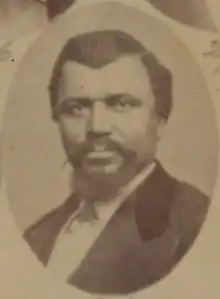
Charles Caldwell (1830 or 1831 – December 25, 1875) was a Reconstruction era political and state militia leader in Mississippi.[1] He held office as a state senator and county commissioner before being assassinated in 1875.[2]
A former slave, he was a delegate to Mississippi's 1868 Constitutional Convention.[3] He worked as a blacksmith in Clinton, Mississippi, a small town about 12 miles from Jackson in Hinds County, Mississippi.[4][3]
Political violence in Clinton included the Clinton Riot after a political rally of African Americans. Governor Adelbert Ames authorized a militia in response and put Caldwell in charge of it in Clinton but later backed down and disbanded it.
The U.S. Congress reported on election violence and Caldwell's assassination.[5] A plaque commemorates his life.[6]
See also
References
- ↑ "Charles Caldwell – Against All Odds".
- ↑ "Caldwell, Charles". Mississippi Encyclopedia.
- 1 2 Wisniewska, Zuzanna (December 2, 2018). "Charles Caldwell (ca. 1831–1875) •".
- ↑ Aptheker, Herbert (1947). "Mississippi Reconstruction and the Negro Leader Charles Caldwell". Science & Society. 11 (4): 340–371. JSTOR 40399859 – via JSTOR.
- ↑ Mississippi in 1875: Report of the Select Committee to Inquire into the Mississippi Election of 1875, United States Congress, Washington D.C., Government Printing Office (1876)
- ↑ "Charles Caldwell (ca. 1831–1875)". December 2, 2018.
Further reading
- Steven J. Niven, “Caldwell, Charles”. African American National Biography, edited by Henry Louis Gates Jr., Oxford African American Studies Center
External links
- His life is retold in the 1949 radio drama "The Story of 1875", a presentation from Destination Freedom, written by Richard Durham